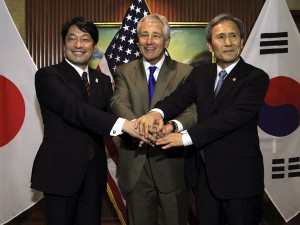Asia warned against destabilising arms race

U.S. Secretary of Defense Chuck Hagel, center, poses with Japan’s Defense Minister Itsunori Onodera, left, and South Korean Defense Minister Kim Kwan-jin, right, pose for photographers before their trilateral meeting on the sidelines of the International Institute for Strategic Studies Shangri-la Dialogue, or IISS Asia Security Summit in Singapore, Saturday, June 1, 2013. AP
SINGAPORE, Singapore—Asian countries must guard against destabilizing the region with increased arms spending, defense chiefs warned at an international security conference Saturday.
Asian governments, boosted by stronger economic growth and worried by regional tensions, have been beefing up their armed forces and there are fears the build-ups could be dangerous in the long run if not managed well.
“There are indeed inherent perceptional sensitivities in military build-ups that could create miscalculations, misjudgements, and mistrust,” Indonesian Defense Minister Purnomo Yusgiantoro told the Shangri-La Dialogue, an annual forum in Singapore.
“In order to avoid military modernization becoming destabilizing, there is a need for greater strategic transparency.”
Asia overtook European members of NATO in terms of nominal military spending for the first time last year, according to a report by the London-based International Institute for Strategic Studies (IISS) released in March.
Article continues after this advertisementIn the annual report on the world’s militaries, the IISS — which organises the Shangri-La Dialogue — said China’s defence spending in real terms rose 8.3 percent between 2011 and 2012, while in Asia as a whole, spending rose 4.94 percent last year.
Article continues after this advertisementGlobally, China now ranks second behind the United States in total military spending, although the Pentagon’s annual budget of $600 billion still dwarfs Beijing’s arms expenditure.
Philip Hammond, Britain’s secretary of state for defense, said rising defence spending in Asia was “worrying” as it was taking place against the backdrop of growing tensions over territorial disputes and competition for resources.
“(It) has the potential to escalate and become at best a prolonged source for instability and at worst, a driver for conflict,” he said.
On May 9, a Philippine coast guard ship fired on a Taiwanese fishing vessel along their sea border, killing a fisherman. Taipei reacted angrily and held naval exercises near the Philippines in a show of force against its bigger but poorly equipped neighbour.
China is locked in a territorial dispute with four Southeast Asian countries in the South China Sea, and with Japan over the Senkaku islands, which Beijing calls the Diaoyus, in the East China Sea.
And on the Korean Peninsula, tensions remain high between US-backed South Korea and the nuclear-armed North.
Latest statistics released by the Stockholm International Peace Research Institute showed China’s estimated defence spending nearly quadrupled from $37 billion in 2000 to $166 billion in 2012.
India’s defence spending has grown 67 percent since 2000, reaching $46.1 billion in 2012, it said.
South Korea’s defence investments swelled from $20 to $31.6 billion while Japan maintained its defence budget throughout the period at $60 billion.
But Tokyo in January announced that it would increase military spending this year for the first time in over a decade by over $1.15 billion under a ruling party plan.
Japanese Defence Minister Itsunori Onodera, who also spoke at the Singapore defence conference, justified the country’s increased spending.
“We believe it is essential to build-up a defence posture that will contribute to the enhancement of regional peace and stability,” he said.